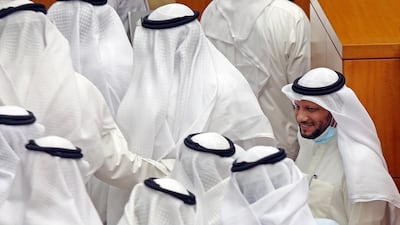The double hits of the coronavirus pandemic and an oil price crash leaves Kuwait at risk of running out of cash for salaries unless parliament approves a debt law, the country’s finance minister said on Wednesday.
The government is withdrawing from its General Reserve Fund at a rate of 1.7 billion dinars a month, meaning liquidity will soon be depleted if oil prices don't improve and if Kuwait can't borrow from local and international markets, Finance Minister Barak Al Sheetan said.
The minister stressed the need of parliament to agree to the government's bill to borrow up to 20 billion dinars (Dh240bn) over 30 years. But MPs pushed the bill back to the finance committee for further study over the next two weeks, state-run Kuna reported.
Government and parliament have long been at odds over debt reform, which would allow Kuwait to tap international markets. But the issue has become more urgent in recent months as the oil-exporting nation has been hit by low crude prices and the Covid-19 pandemic.
"In light of the lack of borrowing and the failure to implement economic reforms, the state's general reserve will run out of liquidity and will not be able to cover its expenditures due to the deficit," Mr Al Sheetan told MPs.
While MPs pushed back on the borrowing bill, they opened a vital lifeline to the government by passing a bill on sovereign wealth fund payments.
Kuwait automatically transfers 10 per cent of the state's revenue every year to the Future Generations Fund, but the law passed by the national assembly on Wednesday will now only allow transfers to the fund when the year's budget is in surplus.
The move frees up 3.8 billion dinars of accrued money that would have otherwise been sent to the Future Generations Fund, Reuters reported. Some additional money set aside for the fund in the current fiscal year would also now remain available to the treasury, according to the document.
“There are real justifications for rejecting the public debt law,” MP Adnan Abdul Samad said on Wednesday about both the debt law and the halting of the 10 per cent revenue transfer. “It’s difficult to approve the public debt law without budget reform.”
Kuwait’s budget deficit increased 69 per cent to 5.64 billion dinars in the last fiscal year, and the government estimates it will more than double to 14 billion dinars in the current fiscal year, ending March 31, Mr Al Sheetan said. Wages and subsidies accounted for 76 per cent of all spending. The International Monetary Fund expects the government’s financial needs to grow at a rapid rate as its liquidity position weakens.
In June, Kuwaiti Emir Sheikh Sabah issued a call to transform the economy to one less reliant on oil and urged rationalising spending. More than 90 per cent of the country’s revenue is generated from oil.
“In the medium to long-term, in the absence of borrowing, more austerity measures will have to be applied to public spending,” Mr Al Sheetan said. “In several decades, the Future Generations Fund will run out, affecting the welfare of citizens and the state."

